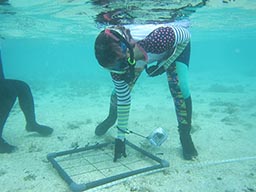- ABOUT US
- PROGRAM AREAS
- CONSERVATION APPROACH
- EDUCATION
- MULTIMEDIA
Anna Rothstein: The Coral Program's 2024 Knauss Fellow

In February, we welcomed our 2024 Knauss fellow, Anna Rothstein. Anna is sponsored by University of Southern California Sea Grant, and received her M.S. in Ecology and Evolution from San Jose State University.
Anna's love of coral reef ecosystems began where you might not expect, the snowy suburbs of Minnesota. Her introduction to the underwater world, and perhaps more importantly, to the world of Jimmy Buffett, can be attributed to her AP Biology teacher in high school. Her teacher's fervor and zest for the natural world enticed Anna to join the SCUBA Club, where students convened once a week before school to learn about SCUBA diving and reef fish identification. Each summer, the club had the chance to put their diving, identification, and Jimmy Buffett singing skills to the test on an actual dive trip. Anna got her first real job to finance her way on these trips, which soon became the highlight of her year, and the rest is history!

During her undergraduate years, while she attended the University of Puget Sound in Tacoma, Washington, Anna developed a deep appreciation for a different marine environment. Her research during this time not only immersed her in the birthplace of marine ecology—the rocky intertidal zone—but also fostered a profound admiration for the interconnectedness of species and their environments. While studying abroad in Turks and Caicos at the School for Field Studies in 2016, she was able to apply her love of marine ecology to coral reef ecosystems. This trip also opened her eyes to the current state of coral reef health in the Caribbean, and cemented her belief that doing what she could to save these precious ecosystems was her calling.
In grad school, Anna's research took her to West Maui, Hawai'i, where she became fascinated with understanding the ecology of less-studied coral reef environments like crevices and tunnels. These areas are often overlooked in standard coral reef monitoring efforts due to how difficult they can be to access. However, when combined, they actually make up a majority of the reef's surface area and are, therefore, incredibly important to understanding how reefs holistically function. This project introduced her to various reef managers and researchers on Maui, and she was able to participate in the Scripps Institute of Oceanography's 100 Island Challenge monitoring efforts.

Throughout her time in academia, Anna always struggled to understand the relevance of her science and yearned to see how her research could translate into actual change. Therefore, various mentors recommended she check out the Knauss fellowship. Now, she not only witnesses how coral reef conservation is managed at the federal level, but also contributes to the development of coral reef conservation, management, and policy.
For more than 40 years, the John A. Knauss Marine Policy Fellowship, administered by NOAA's National Sea Grant College Program, has provided graduate and professional school students with experience in host offices throughout the executive and legislative branches of government. During the year-long program, fellows learn firsthand about ocean, coastal, and Great Lakes resource management and policy. The Coral Reef Conservation Program has hosted many Knauss fellows over the years, and this year is no different.
Anna will support the U.S. Coral Reef Task Force (the Task Force) and the various coral reef efforts of each Task Force working group. She is assisting in planning the 48th annual Task Force meeting in Silver Spring, MD this spring, as well as the 49th meeting in the Northern Mariana Islands this fall. Currently, she is working on a Coral Emergency Funding document, which will serve as a resource in the event of coral emergencies by providing information on available assistance. Anna will also have the opportunity to gain insight into coral reef conservation on an international level by participating in the International Coral Reef Initiative (ICRI) and the Global Coral Reef Monitoring Network. Finally, Anna will be working on communications products for the Watershed working group, all while trying her best to go viral while creating posts for CRCP's social media channels!
Related Stories and Products
About Us

The NOAA Coral Reef Conservation Program was established in 2000 by the Coral Reef Conservation Act. Headquartered in Silver Spring, Maryland, the program is part of NOAA's Office for Coastal Management.

The Coral Reef Information System (CoRIS) is the program's information portal that provides access to NOAA coral reef data and products.
Work With US
U.S. Coral Reef Task Force
Funding Opportunities
Employment
Fellowship Program
Contracting Assistance
Graphic Identifier
Featured Stories Archive

Access the archive of featured stories here...
Feedback
Thank you for visiting NOAA’s Coral Reef Conservation Program online. Please take our website satisfaction survey. We welcome your ideas, comments, and feedback. Questions? Email coralreef@noaa.gov.
Stay Connected
Contact Us
NOAA’s Coral Reef Conservation Program
SSMC4, 10th Floor
1305 East West Highway
Silver Spring, MD 20910
coralreef@noaa.gov
